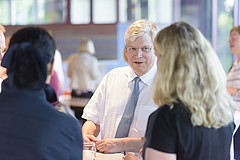For 3rd Time in a Row:
Prof. Dr. Dabbert from the University of Hohenheim Most Popular President in the State [20.02.17]
Ranking from the German Association of University Professors and Lecturers places University President no. 1 in Baden-Württemberg and no. 2 in Germany after Prof. Dr. Koch (Universität Wuppertal)
Vision, determination, “unbelievably high degree of personal dedication” and “transparency in decision-making” are characteristics that are ascribed to Prof. Dr. Stephan Dabbert in the German Association of University Professors and Lecturers’ (DHV) Ranking of Presidents. For the third time in a row, the DHV crowned him the most popular president in Baden-Württemberg. The year before, Prof. Dr. Dabbert, President of the University of Hohenheim in Stuttgart, had even received the award for the most popular university head nationwide. This year that award goes to Prof. Dr. Lamberg T. Koch from the University of Wuppertal. For two years, Prof. Dr. Dabbert has traded places with him for spots 1 and 2.
The DHV Ranking provides a special kind of testimony: Professors and scientists evaluate their presidents. A total of 11 abilities is rated on a scale from 1 to 6 (the German school grading system, 1 being the best and 6 the worst). In the overall evaluation, this year Prof. Dr. Dabbert got the average grade 1.77. The nationwide winner of the ranking was Prof. Koch with a grade of 1.58.
Qualities that are evaluated include leadership abilities, respect for differences in scientific cultures, problem-solving skills, courage in making decisions, vision, fairness, and honesty. Scientists could also include comments on their president’s work in their evaluations.
The reasons for “vision” and “determination” could be a series of initiatives in recent months and years.
These include the strategy to use interdisciplinary research focuses to network the University of Hohenheim as a small, highly specialized university in the areas of agricultural sciences, nutritional science, food science, and business, economic, and social sciences. The research focuses include “Bioeconomy” or the “Big Data Lab” announced last fall, in which scientists from all disciplines work together in developing methods and evaluating large amounts of data from different areas.
Text: Klebs








